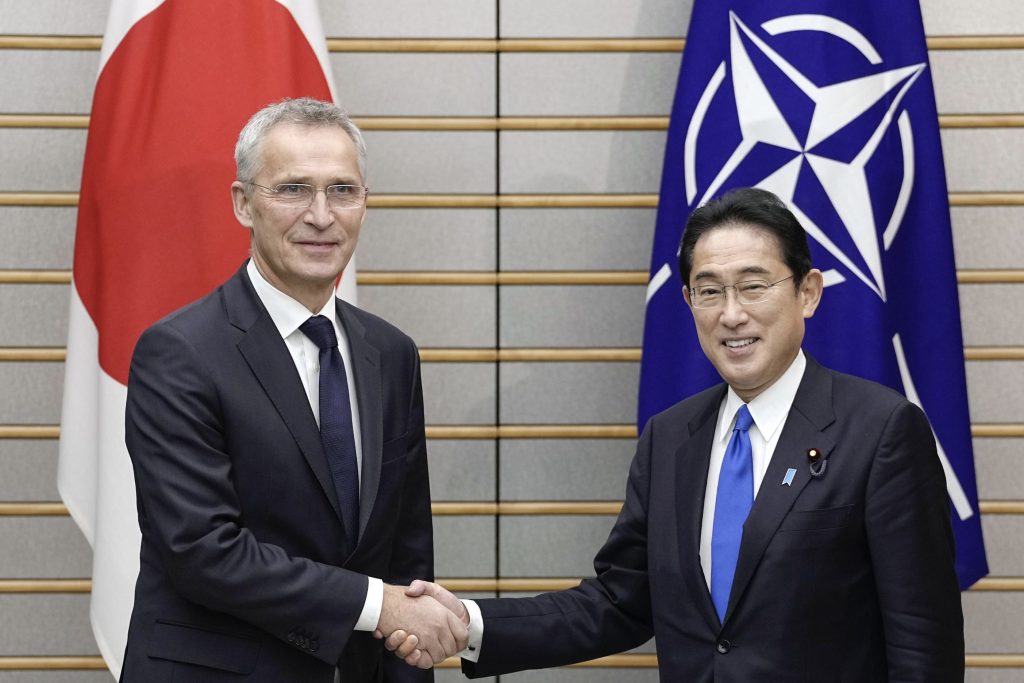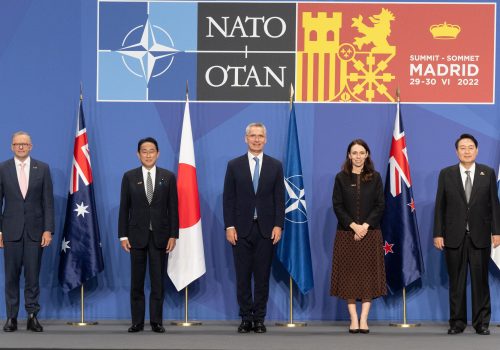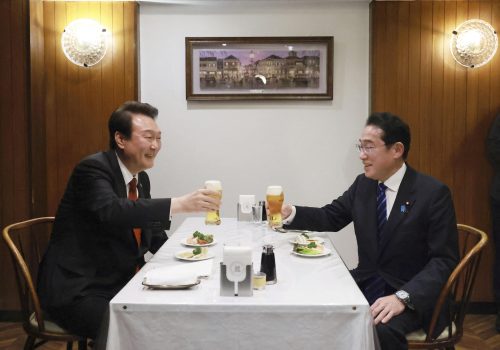“What is NATO really up to?” Chinese Foreign Ministry Spokesperson Wang Wenbin posed this sharp question on June 6. It was in response to a question about Japanese Prime Minister Fumio Kishida’s announcement last month that his government is exploring opening a NATO liaison office in Tokyo. The Chinese official went on to say the Alliance was “bent on going east into this region” and urged “high vigilance.” While the opening of a NATO liaison office in Japan, the first in Asia, would certainly be a significant development in the Alliance’s post–Cold War evolution, such a move ultimately reveals more about how Japan sees its regional security situation unfolding in the coming years than it does about how NATO views China.
The office is currently only an idea, and some NATO members have voiced resistance to it going any further, including French President Emmanuel Macron. If it were actually to happen, however, NATO’s first liaison office in the Indo-Pacific would not be a case of the Alliance extending “its tentacles to the Asia-Pacific,” as Chinese officials have charged in the past. Instead, it would represent the natural culmination of a multi-year effort by Western officials to strengthen cooperation with Asia-Pacific partners, not the start of some grand new security enterprise linking the Pacific and Atlantic alliances together.
After all, NATO and Japan have had formal relations for several decades and the opening of a liaison office, while symbolic, is mainly a tool of bureaucratic efficiency. The creation of a NATO liaison office in Tokyo would merely formalize the exchange of views and dissemination of information that has already been taking place for years, albeit via the Danish Embassy which serves as the NATO Contact Point Embassy in Japan.
Second, this development has as much (if not more) to do with how Japan sees the contemporary regional security situation in its neighborhood than how NATO views the Indo-Pacific. In at least one sense, as the Japanese foreign minister told CNN recently, Japan’s offer to host a NATO office is connected to security developments in Europe. But the connection goes only so far. As the foreign minister noted, Russia’s invasion of Ukraine in 2022 forced his government to “rethink [its] regional security.” Or as Kishida has repeatedly warned since Russia launched its war in February 2022, “Ukraine today may be East Asia tomorrow.” Make no mistake, China’s rising assertiveness in the Indo-Pacific, more so than Russia’s invasion of Ukraine, is the real reason behind Japan’s decision to signal its willingness to welcome a NATO office in Tokyo.
The view from Tokyo
Japan’s offer to host a NATO liaison office should be viewed as part of a wider national security strategic reset the Kishida government has been conducting following the release of its latest national security strategy, national defense strategy, and defense buildup program in December 2022.
Unlike previous Japanese administrations which often focused primarily on strengthening security ties with the United States, the Kishida government’s approach has been multilateral from the outset. Japanese government officials have been working overtime since late last year to improve defense coordination with a number of countries. In October 2022, Japan and Australia signed a new enhanced security cooperation agreement, pledging to deepen their defensive and security ties. Only three months later, in January 2023, Tokyo signed a Reciprocal Access Agreement (RAA) with the United Kingdom. Similar to the status of forces agreements the United States concludes with other countries, the RAA sets out the conditions and procedures that apply when forces from one country visit another. Such agreements are sine qua non when countries want to conduct joint training and military exercises together. After Australia last year, the United Kingdom is only the second country to conclude an RAA with Japan. In April, the Japanese Diet formally approved both RAAs, paving the way for their implementation.
Closer to home, the Kishida government has stepped up efforts to improve security cooperation with South Korea. After a multi-year freeze, a thaw in bilateral relations between Washington’s Indo-Pacific allies has set in, as evidenced by the resumption of leadership-level visits between Seoul and Tokyo earlier this spring. Fresh on the heels of these visits, rumors that a new trilateral security apparatus or forum between Tokyo, Seoul, and Washington could be in the cards have begun to circulate in the press, and a trilateral meeting between the leaders of the three countries recently took place on the sidelines of the Group of Seven summit in Hiroshima last month.
Typically, diplomacy progresses in fits and starts. But by any measure the security cooperation news out of the region in recent months has been anything but. Indeed, the pace of new security agreements, declarations, statements, and other communiques issued by Tokyo and other capitals has been frenetic. And it is in this context that the recent news that the Kishida government has offered to host a NATO office should be viewed. This development, in other words, is notable more for what it reveals about how Tokyo sees the security landscape in the Indo-Pacific unfolding in the coming years, than for how NATO views its role in the region or China.
New office space but no new architecture
In terms of day-to-day activities, a NATO liaison office would likely look to build upon existing areas of military cooperation such as cybersecurity and peace-support operations, as well as explore new avenues of defense cooperation, especially in the area of equipment interoperability. Japan has participated in NATO’s Partnership Interoperability Initiative, the Alliance’s program for strengthening partner equipment interoperability, since the initiative’s founding in 2014. With Tokyo’s announcement last December that it will jointly develop a next-generation fighter jet with the United Kingdom and Italy by 2035, Japan will now require even more regular political and defense consultations with European partners. Along with serving as an information conduit, a NATO liaison office could help Japan expand access to other European defense programmes.
Even so, the opening of a NATO liaison office in Japan is unlikely to fundamentally alter the Indo-Pacific security architecture much. The creation of a one-person deep office for the coordination of information between Tokyo and Brussels does not equate with or portend an extension of the Alliance’s geographic reach into the Indo-Pacific. Rather than signaling some ambitious opening move in a larger strategic game of geopolitical chess, the opening of a NATO liaison office in Japan instead would mark the culmination of a multi-year process by NATO officials to improve ties with long-standing partner countries in the region.
Sara Bjerg Moller, PhD, is a nonresident senior fellow in the Indo-Pacific Security Initiative at the Atlantic Council’s Scowcroft Center for Strategy and Security, as well as an associate teaching professor in the Security Studies Program at Georgetown University.
Further reading
Mon, Feb 27, 2023
Toward a trilateral Atlantic-Pacific community for the twenty-first century
Issue Brief By Ash Jain
As the world approaches a new era of strategic competition with revisionist autocracies, the existing transatlantic political, economic, and security entities need to be further expanded to build a trilateral Atlantic-Pacific community.
Mon, Mar 27, 2023
Are South Korea-Japan relations finally getting back on track?
New Atlanticist By Thomas Cynkin
The more that Japan shows its relationship with Korea is a two-way street, the more sustainable it will be in the face of Korean public opinion.
Mon, May 8, 2023
Japan’s monetary trilemma is a warning to the world
Econographics By
High inflation, high levels of debt, and uncertain financial stability - Washington, London, Brussels, Frankfurt and beyond have much to learn from Tokyo's experience.
Image: NATO Secretary General Jens Stoltenberg (L) and Japan's Prime Minister Fumio Kishida shake hands before holding talks at the premier's office in Tokyo on Jan. 31, 2023.



